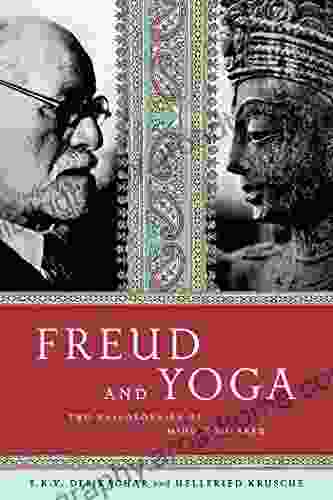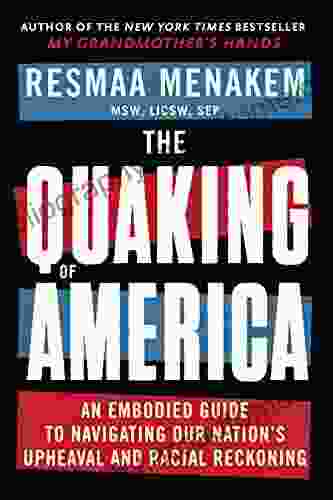Freud and Yoga: Two Philosophies of Mind Compared

Sigmund Freud and the ancient Indian sages of yoga have much to teach us about the human mind and its functions. While their respective philosophies and practices emerged from vastly different cultural and historical contexts, they share a number of striking similarities, as well as some key differences. By comparing these two systems of thought, we can gain a deeper understanding of ourselves and our place in the world.
4.6 out of 5
| Language | : | English |
| File size | : | 647 KB |
| Text-to-Speech | : | Enabled |
| Screen Reader | : | Supported |
| Enhanced typesetting | : | Enabled |
| Word Wise | : | Enabled |
| Print length | : | 172 pages |
Freud's Psychoanalysis
Freud's psychoanalysis is a theory of the mind that focuses on the unconscious mind and its influence on our thoughts, feelings, and behaviors. Freud believed that the unconscious mind is a repository of repressed memories, desires, and conflicts that can only be accessed through indirect methods such as dream analysis and free association.
According to Freud, the unconscious mind is divided into three parts: the id, the ego, and the superego. The id is the impulsive, pleasure-seeking part of the mind that is driven by basic instincts such as hunger and sex. The ego is the rational, reality-oriented part of the mind that mediates between the id and the superego. The superego is the moral, ethical part of the mind that represents our values and ideals.
Freud believed that the unconscious mind plays a significant role in our mental health and well-being. When our unconscious conflicts are repressed, they can lead to anxiety, depression, and other psychological problems. Psychoanalysis aims to bring these unconscious conflicts to the surface so that they can be resolved and healed.
Yoga Philosophy
Yoga philosophy is a system of thought and practice that originated in ancient India. Yoga is based on the belief that the mind, body, and spirit are interconnected and that we can achieve a state of physical, mental, and spiritual well-being through a variety of practices such as meditation, mindfulness, and physical postures.
According to yoga philosophy, the mind is a subtle energy field that is constantly fluctuating. The goal of yoga is to still the mind and bring it to a state of equilibrium. This can be achieved through a variety of practices such as meditation, mindfulness, and pranayama (breath control).
Yoga philosophy also emphasizes the importance of self-awareness and self-inquiry. Yoga practitioners are encouraged to observe their thoughts and feelings without judgment and to develop a deep understanding of their own inner workings. This process of self-discovery can lead to a profound transformation of the mind and a greater sense of peace and well-being.
Similarities between Freud's Psychoanalysis and Yoga Philosophy
Despite their different origins and methods, Freud's psychoanalysis and yoga philosophy share a number of striking similarities. These similarities include:
* Emphasis on the unconscious mind: Both psychoanalysis and yoga philosophy recognize the importance of the unconscious mind and its influence on our thoughts, feelings, and behaviors. * Focus on self-discovery: Both psychoanalysis and yoga philosophy encourage individuals to explore their own inner workings and to develop a deep understanding of themselves. * Goal of mental health and well-being: Both psychoanalysis and yoga philosophy aim to help individuals achieve a state of mental health and well-being.
Differences between Freud's Psychoanalysis and Yoga Philosophy
While Freud's psychoanalysis and yoga philosophy share a number of similarities, they also have some key differences. These differences include:
* Approach to the unconscious mind: Psychoanalysis focuses on accessing the unconscious mind through indirect methods such as dream analysis and free association. Yoga philosophy, on the other hand, focuses on stilling the mind and bringing it to a state of equilibrium through practices such as meditation and breath control. * View of the mind: Psychoanalysis views the mind as a complex structure that is divided into different parts, such as the id, the ego, and the superego. Yoga philosophy views the mind as a subtle energy field that is constantly fluctuating. * Role of the body: Psychoanalysis focuses primarily on the mind. Yoga philosophy, on the other hand, emphasizes the interconnectedness of the mind, body, and spirit. Yoga practices such as physical postures and pranayama are designed to promote physical and mental well-being.
Freud's psychoanalysis and yoga philosophy are two powerful systems of thought and practice that can help us to understand ourselves and our place in the world. While they have different origins and methods, they share a number of striking similarities, as well as some key differences. By comparing these two systems of thought, we can gain a deeper understanding of the human mind and its functions.
4.6 out of 5
| Language | : | English |
| File size | : | 647 KB |
| Text-to-Speech | : | Enabled |
| Screen Reader | : | Supported |
| Enhanced typesetting | : | Enabled |
| Word Wise | : | Enabled |
| Print length | : | 172 pages |
Do you want to contribute by writing guest posts on this blog?
Please contact us and send us a resume of previous articles that you have written.
 Book
Book Novel
Novel Page
Page Chapter
Chapter Text
Text Story
Story Genre
Genre Reader
Reader Library
Library Paperback
Paperback E-book
E-book Magazine
Magazine Newspaper
Newspaper Paragraph
Paragraph Sentence
Sentence Bookmark
Bookmark Shelf
Shelf Glossary
Glossary Bibliography
Bibliography Foreword
Foreword Preface
Preface Synopsis
Synopsis Annotation
Annotation Footnote
Footnote Manuscript
Manuscript Scroll
Scroll Codex
Codex Tome
Tome Bestseller
Bestseller Classics
Classics Library card
Library card Narrative
Narrative Biography
Biography Autobiography
Autobiography Memoir
Memoir Reference
Reference Encyclopedia
Encyclopedia Fabio Vighi
Fabio Vighi Karen Bradshaw
Karen Bradshaw Maria Youtman
Maria Youtman Maurice Hamilton
Maurice Hamilton Patrick Li
Patrick Li Erik Tempelman
Erik Tempelman James S Major
James S Major Seb Baum
Seb Baum Ian Johnston
Ian Johnston Karen Grassle
Karen Grassle Jin Xiong
Jin Xiong Tavis Leaf Glover
Tavis Leaf Glover Eric Wareheim
Eric Wareheim Nico Anastasio
Nico Anastasio Emma Parker
Emma Parker Ming Ho Yu
Ming Ho Yu Elsie Wild
Elsie Wild Emily Levesque
Emily Levesque Epic Games
Epic Games Eric Stein
Eric Stein
Light bulbAdvertise smarter! Our strategic ad space ensures maximum exposure. Reserve your spot today!
 Felipe BlairFollow ·19.2k
Felipe BlairFollow ·19.2k Robert HeinleinFollow ·5.9k
Robert HeinleinFollow ·5.9k Miguel de CervantesFollow ·15.9k
Miguel de CervantesFollow ·15.9k Hassan CoxFollow ·13.3k
Hassan CoxFollow ·13.3k Griffin MitchellFollow ·6.2k
Griffin MitchellFollow ·6.2k Eugene ScottFollow ·13.7k
Eugene ScottFollow ·13.7k Roberto BolañoFollow ·11.9k
Roberto BolañoFollow ·11.9k Spencer PowellFollow ·10.1k
Spencer PowellFollow ·10.1k

 Troy Simmons
Troy SimmonsStories From The Life Of Baha: A Must-Read For Spiritual...
Discover the Inspiring Teachings and Enriching...

 Wesley Reed
Wesley ReedDuke Review of MRI Principles: Case Review - Your Gateway...
Unveiling the Essence...

 Ralph Waldo Emerson
Ralph Waldo EmersonThe Big Book of NFTs: Your Ultimate Guide to the Digital...
In the rapidly evolving world of digital...

 Jason Hayes
Jason HayesUnveiling the Labyrinth: The Cheat Sheet Novel and its...
In the realm...
4.6 out of 5
| Language | : | English |
| File size | : | 647 KB |
| Text-to-Speech | : | Enabled |
| Screen Reader | : | Supported |
| Enhanced typesetting | : | Enabled |
| Word Wise | : | Enabled |
| Print length | : | 172 pages |
















